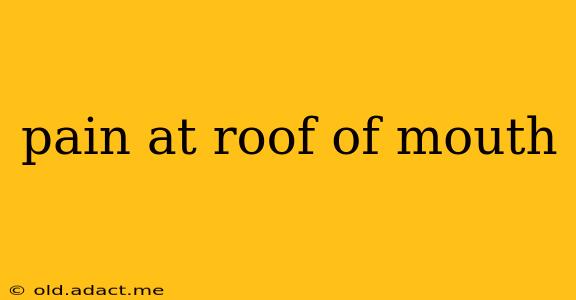Pain at the roof of your mouth, also known as the palate, can be a frustrating and sometimes concerning experience. The cause can range from minor irritations to more serious underlying conditions. This comprehensive guide will explore the various reasons why you might be experiencing this pain, helping you understand the symptoms and potential treatments.
What Causes Pain on the Roof of the Mouth?
The roof of your mouth is a delicate area, susceptible to a variety of issues. Several factors can contribute to pain in this region:
-
Minor Irritation: This is often the most common cause. Eating hot foods, biting your palate accidentally, or consuming acidic foods and drinks can cause temporary discomfort. Sharp edges on broken teeth or ill-fitting dentures can also create irritation.
-
Canker Sores (Aphthous Ulcers): These are small, painful ulcers that can develop on the mucous membranes of the mouth, including the roof of the mouth. They are typically oval or round and can be quite tender. While the exact cause is unknown, stress, hormonal changes, and nutritional deficiencies are considered potential triggers.
-
Cold Sores (Herpes Simplex Virus): Cold sores are caused by the herpes simplex virus (HSV) and usually manifest as blisters on the lips or around the mouth, but can sometimes appear on the palate. They are highly contagious.
-
Oral Thrush (Candidiasis): This fungal infection, caused by an overgrowth of Candida yeast, can cause white patches and soreness on the roof of the mouth. It’s more common in individuals with weakened immune systems, those taking antibiotics, or those wearing dentures.
-
Mouth Ulcers (Apthous ulcers): These can vary in size and severity. While many are minor, they can cause significant discomfort. Some individuals may develop recurrent aphthous stomatitis (RAS) experiencing regular occurrences.
-
Burning Mouth Syndrome: This condition, primarily affecting women, causes a persistent burning sensation in the mouth, including the palate, without any visible sores or lesions. The cause is often unknown, but it can be linked to hormonal changes, nutritional deficiencies, or underlying medical conditions.
-
Dry Mouth (Xerostomia): Lack of saliva can lead to dryness and discomfort, often accompanied by a burning sensation on the roof of the mouth. This can result from various factors, including medication side effects, dehydration, or underlying medical conditions such as Sjogren’s syndrome.
-
Tumors (rare): While less common, pain on the roof of the mouth could be a symptom of a cancerous or non-cancerous tumor. This warrants immediate medical attention if accompanied by other symptoms such as persistent bleeding, lumps, or difficulty swallowing.
How Long Does Roof of Mouth Pain Last?
The duration of pain at the roof of your mouth varies considerably depending on the underlying cause:
- Minor irritation: Usually resolves within a few days to a week.
- Canker sores: Typically heal within 7-10 days.
- Cold sores: Can last for 10-14 days.
- Oral thrush: Requires treatment and may take several weeks to clear up.
- Burning mouth syndrome: Can be persistent and long-lasting, requiring ongoing management.
- Tumors: Requires immediate medical attention; duration depends on the type and treatment.
What are the Symptoms of Roof of Mouth Pain?
Symptoms can vary depending on the cause but can include:
- Sharp, burning pain: Often associated with minor irritations, canker sores, or cold sores.
- Throbbing pain: Associated with more significant ulcers or infections.
- Numbness: Can indicate nerve damage or more serious conditions.
- White or red patches: Suggest oral thrush or other infections.
- Difficulty swallowing: May indicate more severe underlying conditions.
- Bleeding: Can indicate trauma, infection, or a more serious condition.
When Should I See a Doctor About Roof of Mouth Pain?
Seek medical attention if:
- The pain is severe or persistent (lasting longer than two weeks).
- You have difficulty swallowing or breathing.
- You notice bleeding, lumps, or unusual growths.
- You have a weakened immune system.
- The pain is accompanied by fever or other symptoms of illness.
How is Pain on the Roof of the Mouth Treated?
Treatment depends on the underlying cause:
- Minor irritations: Often resolve on their own; rinsing with salt water can provide relief.
- Canker sores: Over-the-counter pain relievers and mouthwashes can help.
- Cold sores: Antiviral medications can shorten the duration.
- Oral thrush: Antifungal medications are typically prescribed.
- Burning mouth syndrome: Management involves addressing underlying causes and utilizing pain relief strategies.
- Tumors: Requires specialized medical treatment, depending on the type and stage.
This information is intended for general knowledge and does not constitute medical advice. Always consult with a healthcare professional for diagnosis and treatment of any medical condition. They can properly assess your symptoms and recommend the appropriate course of action.
